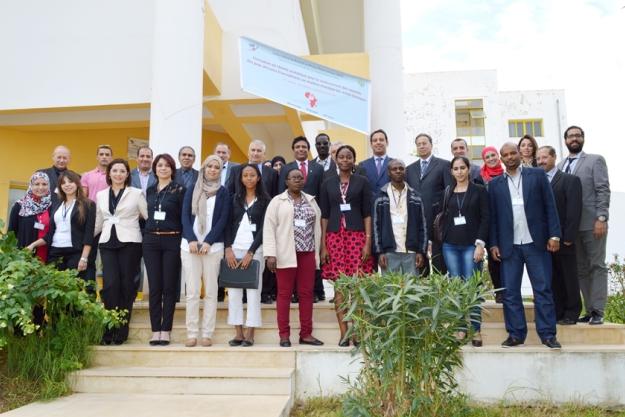
Participants at the Analytical Chemistry Course under the Programme to Strengthen Cooperation with Africa
With the support of the Government of Tunisia, from 26 October to 6 November 2015 the OPCW organised jointly with the Tunisian National Institute for Research and Physical-Chemical Analysis (INRAP), the 3rd Analytical Chemistry course in French for French speaking Member States from the Africa region. The course was organised under the Programme to Strengthen the Cooperation with Africa and was held at the INRAP’s premises.
A total of 13 qualified participants from 11 Member States* successfully completed this course. They are chemistry professionals from industry, government, and academia who are involved in the analysis, synthesis, or quality control of chemicals related to the Chemical Weapons Convention (hereinafter “the Convention”).
During the course, participants gained the necessary skills and working knowledge of the principles, procedures, and applications of gas chromatography (GC) and gas chromatography mass spectrometry (GC-MS) for the analysis of chemicals related to the Convention.
The course began with a presentation on the Convention and its role in fostering international cooperation for peaceful purposes in the field of chemical activities. It then continued with the provision of basic training and hands-on experience in sample preparation, and with instruction in GC and GC-MS analytical techniques. This included an explanation of the hardware involved, instrument testing and optimisation, basic maintenance, and trouble-shooting.
The programme also covered the preparation of environmental samples and the use of GC and GS-MS for the analysis of samples of chemicals related to the Convention. Participants were provided with intensive hands-on training in the handling of different sample matrices for subsequent analysis by GC with element-selective detectors and by GC-MS in electron ionisation mode.
The principles of conducting analyses were explained and a range of extraction, clean up, and derivatisation procedures were conducted. Aspects on the importance of laboratory safety, quality control of analytical data, including the use of libraries, were also covered.
At the closing session, the participants were encouraged to enhance their effective contributions at national and regional levels through networking among each other, knowledge transfer, advising national industries and organising subsequent trainings. As per practice, the OPCW will be supporting their efforts and initiatives in this regard.
* Algeria, Burkina Faso, Burundi, Cameroon, Democratic Republic of Congo, Djibouti, Madagascar, Mauritius, Morocco, Senegal, Tunisia.
